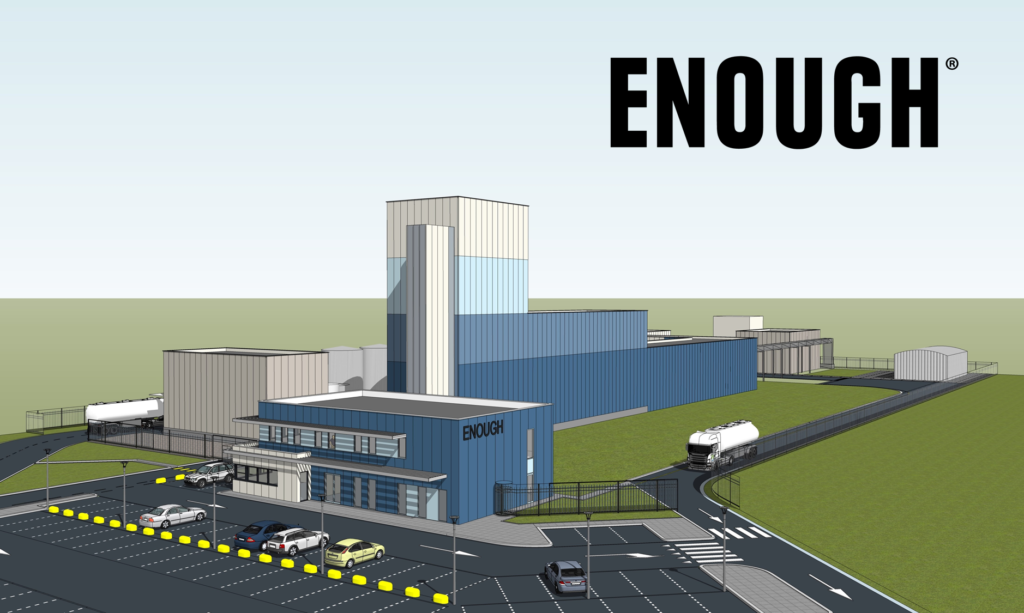ENOUGH Breaks Ground in the Netherlands for the World’s Largest Fermented Protein Facility
ENOUGH picks Zeeland for its new sustainable protein production factory
Food tech company ENOUGH (formerly 3F BIO) announces the start of the construction for its first of its kind protein factory, which will be located in the Netherlands. The new factory in Sas van Gent in Zeeland is targeted as the largest new non-animal protein farm to be built worldwide. The factory will be operational in 2022 with initial capacity to produce 10,000 tonnes per annum.
Jim Laird, CEO of ENOUGH says: “Demand for non-animal protein is forecast to grow at 15,000 tonnes per day for the next 5,000 days. ENOUGH uses technology which is scalable today to contribute towards the protein transition, and work with customers who share our hunger and passion for great tasting products that taste as good as and cost not more than the animal alternative.
ENOUGH collaborates with Cargill in the Netherlands
The 15,000 square metre (160,000 square feet) facility is co-located alongside the Cargill facility in Sas van Gent, the Netherlands. The location and collaboration with Cargill will ensure the most efficient feed source, as well as supporting zero-waste advantages of ENOUGH’s product. The investment initially creates 25 new jobs and this will double with plans for more than 50,000 tonnes of capacity by 2027.
Franck Monmont, Managing Director for Cargill’s Starches, Sweeteners and Texturizers business in Europe said: “As global demand for protein continues to rise, this collaboration with ENOUGH serves as another avenue to help realize our mission of nourishing the world in a safe, responsible and sustainable way. At Cargill, we are committed to bringing alternative and traditional protein source options to the table. We see ENOUGH’s mycoprotein as a valuable and sustainable alternative source of protein and are looking forward to our collaboration in the years to come.”
Sustainable source of food protein, reducing 6 million tons of CO2 emissions
Producing vast quantities of healthy and sustainable protein is one of the most urgent global priorities. ENOUGH addresses this by growing ABUNDA mycoprotein, an existing advantaged ingredient with an established market role, more sustainably and at a lower cost than other protein options. ENOUGH produces the mycoprotein by fermenting fungi using renewable feedstocks to make the most sustainable source of food protein.
Using fermentation to meet future food protein needs is widely recognised as being the most effective solution to feed a growing planet. ENOUGH’s process is readily scalable to use any locally grown feedstock and with plans to extend beyond Europe ENOUGH targets growing over a million tonnes by 2032. This is the equivalent to reducing more than 6 million tonnes of CO2 emissions or the equivalent of planting more than 30 million trees.
Bio Based Europe Joint Undertaking
The new facility is one of 11 flagship projects which have support from the circular Bio Based Europe Joint Undertaking. This consortium contributes to enhancing sustainability and creating new bio-based jobs and products. ENOUGH’s facility has received €16.9 million funding as part of project Plenitude. Laird added: “We are extremely privileged to have the support from the Bio-Based industries Joint Undertaking and the strength of some amazing collaborative partners in Project Plenitude to help address this.”
BBI JU Executive Director, Philippe Mengab said “The Plenitude project addresses some of the fundamental challenges of our times addressed by the European Green Deal, in particular those related to climate mitigation and food security. The project’s focus on sustainable production of alternative proteins holds a significant promise to reduce carbon emissions and help meeting European climate goals. Moreover, Plenitude will support the growth of the European bio-based industries and boost local economies by attracting additional private investments and generating thousands of jobs in rural areas.”
Source: ENOUGH Food
16 September 2021
